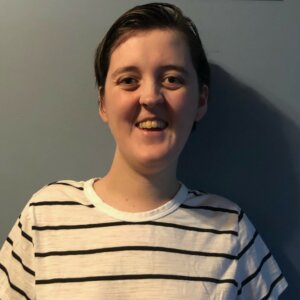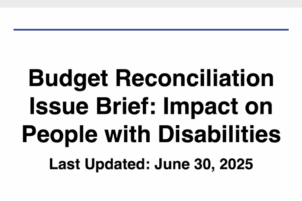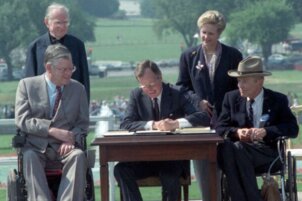Throughout my childhood education, I took my own short, wheelchair accessible bus to the school a town over from mine. My town’s school was less than a mile from my house, but they had refused to accommodate me. My mother fought tooth and nail, got a lawyer, and the local school ended up footing the bill to send me to the next town over. By the time I graduated, I knew I had my parents to thank for getting me an equal education and supports to live, but I did not comprehend all of the work of the generations of disabled people before me that had created this pathway. I think it was this experience that made me want to understand the societal aspects of disability and major in Disability Studies in college.
In college, I took a class in Disability History, and learned that the laws that protected people with disabilities were not just given; they were fought for by disabled activists. It made me realize the role disability history had played in my life. My education, medical care, and community supports were all a direct result of years of hard-fought activism.
When I started my Fellowship at RespectAbility, I pitched the idea of doing a social media series on disability history, because it is such an under-taught topic that is essential to understanding how to address the issues the disability community still faces today. I was so grateful to share Tom Olin’s and Anthony Tusler’s photographs in the series to help bring these important events to life. While at community college, I took the public bus for the first time, photographing the experience for my photography class. It was not until creating this project that I realized how ADAPT’s actions and Tom Olin documenting them allowed such a moment to occur.
During my interview with Tom Olin, he stressed the importance of the next generation of leaders focusing on the most marginalized in our community, specifically those in prisons and other institutions, stating, “What is our priority? Is it accessibility or is it choices and rights for all of us…If you use the words nothing about us without all of us, then you’re lying to yourself.” He then went on to share his belief that the organization HEARD’s vision should be a vision for all of us: “We envision a world where multiply-marginalized disabled people are inherently valued and have the resources, safety and love they need to thrive and live self-determined lives. We dream of a world that honors our interdependence, invests in our healing from harm and trauma, recognizes our potential for growth and transformation, and ensures our collective liberation.”
My interview with Tom has inspired me to continue to share disability history, while fighting for the rights of the most marginalized in our community; taking important lessons from history and paying it forward to the next generation of people with disabilities. I encourage everyone to take Tom’s advice and connect with an ADAPT chapter or Independent Living Center in your area and see what you can do to help shape disability history.








